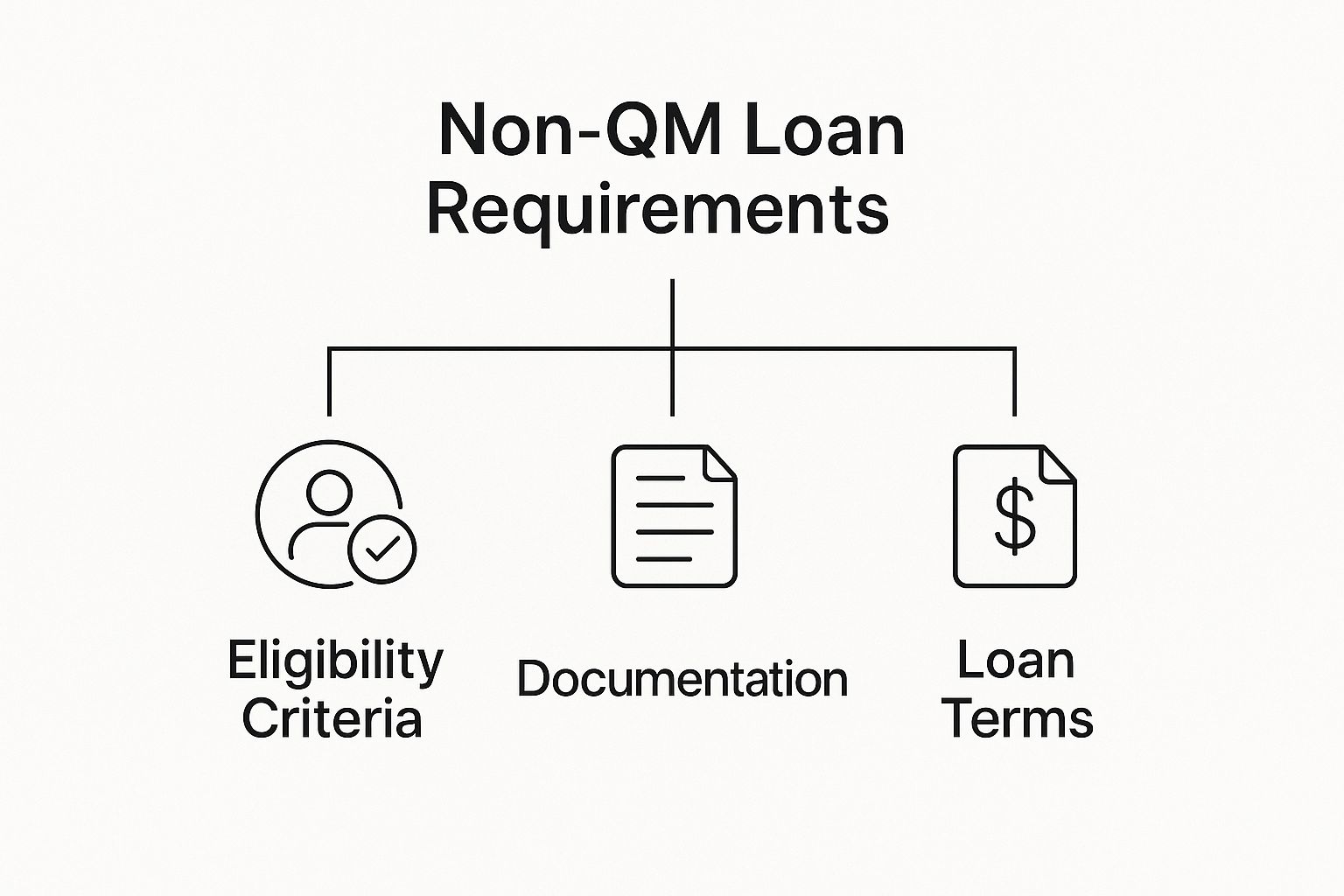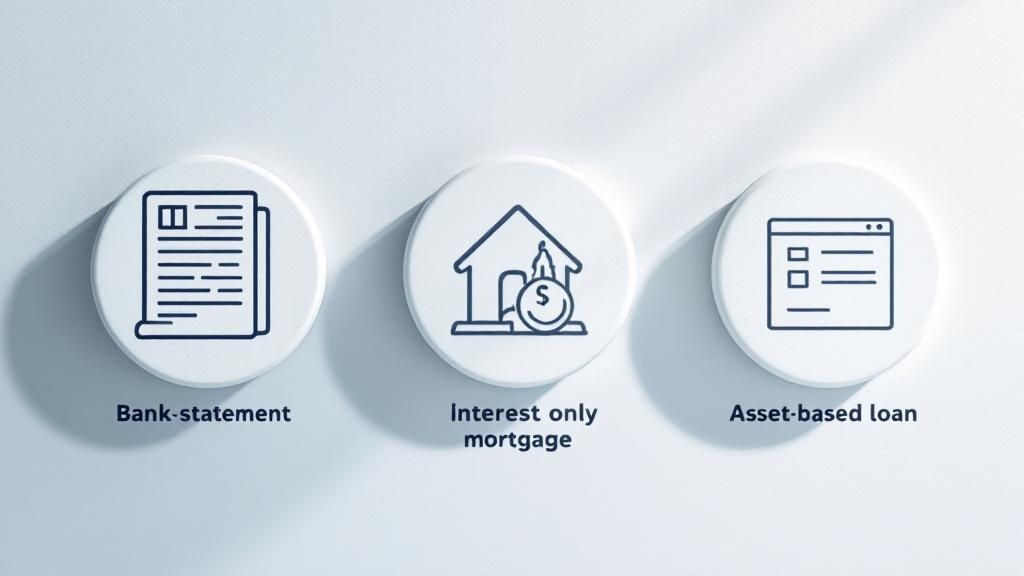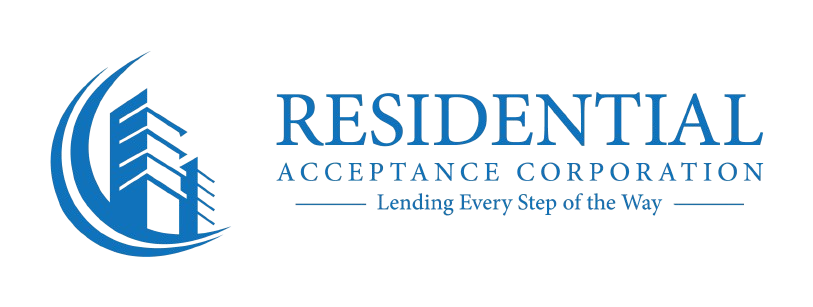Non-QM loan requirements ditch the rigid, one-size-fits-all approach of traditional mortgages. Instead, they rely on alternative income verification methods, a huge plus for creditworthy borrowers who just don't fit into the standard W-2 and tax return box.
Think of self-employed entrepreneurs or real estate investors—people with solid financials who get told "no" by the big banks. This is where Non-QM loans step in.
Unlocking Homeownership with Flexible Criteria
A traditional mortgage is like an off-the-rack suit. It’s made for a standard shape, and if you don't fit those exact measurements, you're out of luck. Non-QM loans, on the other hand, are the custom-tailored suit. They're built around your unique financial picture, creating a path to homeownership that actually considers your real ability to repay the loan.
This kind of flexibility is a game-changer. Millions of Americans are business owners, freelancers, or part of the gig economy. Instead of getting an automatic "no" because of strict income rules, Non-QM loans allow lenders like Residential Acceptance Corporation (RAC Mortgage) to look at the whole story.
What Does This Mean for You?
At its core, the big difference with non qm loan requirements is how we verify your financial stability. We're not stuck with just one way to prove you can handle the loan. We've got multiple options.
- Beyond the Pay Stub: Traditional loans live and die by W-2s and recent pay stubs. Non-QM can use 12 or 24 months of bank statements, your asset levels, or even a property's potential income to qualify you.
- Focus on Cash Flow: For business owners, this is massive. Your consistent business deposits can prove your income, even if your tax returns show a ton of write-offs. We look at the money coming in, not just the bottom line after deductions.
- Empowering Investors: Real estate investors can get approved based on a property's rental income (using a DSCR loan), not their personal salary. It’s a common-sense approach to underwriting.
This quick comparison shows the fundamental differences in how your financial picture is evaluated for a traditional versus a Non-QM loan.
QM vs. Non-QM Loan Requirements at a Glance
| Requirement Type | Traditional QM Loan | Non-QM Loan (RAC Mortgage) |
|---|---|---|
| Income Verification | Strict W-2s, pay stubs, tax returns | Flexible: Bank statements, asset depletion, DSCR, 1099s |
| Debt-to-Income (DTI) Ratio | Rigid cap, typically below 43% | Higher DTI ratios often allowed; sometimes no DTI calculated |
| Credit History | Higher credit scores preferred; recent credit events are deal-breakers | More lenient on credit scores; programs for recent credit events exist |
| Employment Type | Prefers stable, long-term W-2 employment | Ideal for self-employed, freelancers, investors, and gig workers |
| Property Types | Primarily for primary residences | More open to investment properties, multi-family, non-warrantable condos |
As you can see, the Non-QM path is all about providing options that align with how people actually earn and manage their money today.

The process looks at your eligibility, documentation, and loan terms with a much wider lens than a standard mortgage. It's this custom-tailored approach that ensures a broader range of qualified, capable buyers can get the financing they need to purchase a home.
Who Actually Uses Non-QM Loans?

It’s easy to think of Non-QM loans as just another financial product, but they’re actually a lifeline for real people with modern careers. The typical mortgage borrower has changed dramatically over the last few decades. A huge slice of today's workforce doesn't get a neat and tidy W-2, which can make a standard mortgage application a non-starter.
By 2025, it's estimated that over 60 million Americans will be self-employed or working as 1099 contractors. Many of them simply won't qualify for conventional loans that are so fixated on traditional income verification. This is where Non-QM lending comes in. A specialist lender like Residential Acceptance Corporation (RAC Mortgage) looks at the whole picture—cash flow, assets, and overall financial strength—not just what's on a tax return.
The Freelance Consultant with Fluctuating Income
Let's talk about Sarah. She's a fantastic freelance graphic designer, and her income shows it. The only problem? It's not consistent month-to-month. One quarter she’s swamped with big projects, the next is a bit slower. A traditional lender sees that fluctuation as a red flag. We see a successful business with a predictable annual cash flow.
A Bank Statement Loan is the perfect fit for someone like Sarah. We’ll look at her business bank statements from the last 12 or 24 months to calculate a stable, average monthly income. It’s a common-sense approach that shows her true earning power, sidestepping the limitations of tax returns loaded with business write-offs.
The Savvy Real Estate Investor
Now, meet Mark. He’s a real estate investor who wants to add another property to his growing portfolio. He doesn't want to qualify based on his personal salary; he wants the property to stand on its own two feet.
This scenario is exactly what a Debt Service Coverage Ratio (DSCR) loan was made for. This type of Non-QM loan focuses entirely on the rental property's ability to generate enough income to cover the mortgage and other expenses. Simple as that.
A DSCR loan allows an investor’s portfolio to grow based on the strength of the assets themselves, not personal W-2 income. It’s a business-minded approach to real estate financing that makes perfect sense for experienced investors.
The Business Owner Reinvesting Profits
Finally, there’s David. He runs a booming construction company and, like any smart business owner, he reinvests a lot of his profits back into the business for new equipment and staff. While that’s a great move for growth, it tanks his personal taxable income, making a traditional mortgage approval feel impossible.
For borrowers like David, the flexibility in non qm loan requirements creates a path to homeownership. By analyzing his company's gross deposits before all those deductions, we get a much clearer picture of his financial capacity. This is the kind of practical underwriting you’ll find when working with an experienced non-QM mortgage lender in Florida.
These examples aren't edge cases—they represent the modern economy. Non-QM loans are built for creditworthy people whose success just doesn't fit into the traditional lending box.
The Real Documentation You Will Need

When you step away from the world of W-2s and tax returns, the big question becomes: what paperwork do I actually need? For a Non-QM loan, it’s less about a rigid checklist and more about telling a clear, logical financial story.
Instead of forcing you into a one-size-fits-all box, lenders like Residential Acceptance Corporation (RAC Mortgage) tailor the documentation to your specific situation. The whole point is to paint an accurate picture of your ability to repay the loan, even if the usual methods don't work for you.
And this market is growing. Fast. Projections show Non-QM originations could blow past $150 billion in 2025. This isn't surprising when you consider how many successful freelancers, entrepreneurs, and investors need lenders who get how their finances actually work.
Bank Statement Loans The Gold Standard for Entrepreneurs
For the self-employed and business owners, the Bank Statement Loan program is a complete game-changer. Tax returns are designed to minimize your taxable income through deductions, which is great for tax season but not so great for getting a mortgage. This program looks at what really matters: your actual cash flow.
It’s a pretty straightforward process:
- Gather Your Statements: You’ll need to provide 12 or 24 months of your personal or business bank statements.
- We Analyze the Deposits: The lender goes through these statements to figure out a consistent, average monthly income based on your deposits.
- Build Your Case: This calculated figure becomes the income used for your mortgage application, giving a much more realistic view of your business's health.
This common-sense approach makes it one of the most popular Non-QM options out there. For a closer look at the kinds of paperwork involved, you can check out our guide on what documents are needed for a mortgage application.
Asset Depletion Loans Turning Savings into Income
What if you have plenty of assets but not a lot of traditional, monthly income? This is a common situation for retirees or high-net-worth individuals. An Asset Depletion loan solves this problem by turning your eligible assets into a qualifying income stream.
Basically, we take a look at your verifiable assets—think savings, stocks, and retirement funds—and use a formula to amortize that value over a set period. This creates a monthly "income" figure from your wealth, opening the door to homeownership when it might have otherwise been closed.
DSCR Loans for Real Estate Investors
For property investors, your personal W-2 income is often irrelevant. What matters is whether the investment property itself can generate enough cash to pay its own way. That's exactly what a Debt Service Coverage Ratio (DSCR) loan is for.
A DSCR loan focuses entirely on the property’s income potential. If the projected rental income can cover the monthly mortgage payment and other expenses, your personal income doesn't even come into the picture.
This is a powerful tool that allows investors to scale their portfolios based on the financial merit of each individual property. It’s a pure business-centric approach that aligns perfectly with an investor’s mindset.
To make sense of these options, here's a simple breakdown of the most common documentation types used in the Non-QM world.
Common Non-QM Documentation Types and Their Uses
| Loan Program Type | Ideal Borrower | Primary Documentation Needed |
|---|---|---|
| Bank Statement Loan | Self-employed, entrepreneurs, gig workers | 12 or 24 months of personal or business bank statements. |
| Asset Depletion Loan | Retirees, high-net-worth individuals | Statements verifying liquid assets (stocks, bonds, savings). |
| DSCR Loan | Real estate investors | Lease agreements and/or an appraisal with a market rent schedule. |
Each of these programs provides a pathway to financing by focusing on the borrower's true financial capacity, rather than just what a tax return shows. It’s about finding the right tool for the right job.
Navigating Credit and Down Payment Realities
Alright, let's talk about the two things that cause the most headaches in any mortgage process: credit scores and the cash needed for a down payment. Non-QM loans are famous for their flexibility, but it's crucial to understand this doesn't mean it's a free-for-all with no standards. A decent credit history and a healthy down payment are still very important pieces of the puzzle.
The real difference with non qm loan requirements is how lenders look at these numbers. Instead of hitting a brick wall because of a rigid rule, Non-QM lenders like Residential Acceptance Corporation (RAC Mortgage) look at your entire financial story. This allows for a much more balanced, common-sense evaluation.
The Interplay Between Credit and Down Payment
Picture your credit score and down payment as two ends of a seesaw. If one side is a little low, the other side needs to be a bit higher to keep things balanced. This back-and-forth is at the heart of Non-QM underwriting and opens up multiple ways to get to "yes."
For example, a borrower whose credit score is just shy of what conventional loans require might still have a fantastic application if they bring a larger down payment to the table. Putting down 20% or more significantly lowers the lender's risk and proves you're serious about the property. This single move can often make up for a credit history that isn't perfect.
A larger down payment acts as a powerful compensating factor. It shows financial stability and can often make the difference between a 'no' from a traditional bank and a 'yes' from a Non-QM specialist like RAC Mortgage.
On the flip side, someone with a stellar credit score but less cash saved for a down payment could still be a very strong candidate. A high credit score shows a long, reliable history of paying bills on time, giving the lender the confidence they need to approve the loan with less money upfront.
Strengthening Your Overall Financial Profile
It's not just about those two numbers, though. Your whole financial picture matters. If you have substantial liquid assets—like savings, investments, or retirement accounts—that can seriously strengthen your application. These assets prove you have a financial cushion to handle life's curveballs without missing a mortgage payment.
Ultimately, Non-QM lenders are looking at the totality of your circumstances. They piece together your income, assets, credit, and down payment to see if they tell a consistent story about your ability to handle the loan.
If you're worried about where you stand, being proactive is always the best move. For anyone looking to give their application an extra edge, learning how to improve your credit score for a mortgage can provide a clear advantage. By understanding this holistic approach, you can put your application together with a smart strategy, confident that your entire financial situation will be taken into account.
Why This Loan Type Is Reshaping Mortgages
The rise of Non-QM loans isn’t just some flash in the pan; it's a direct answer to a huge shift in how Americans work. For a long time, the mortgage world was built for one type of person: someone with a steady W-2 job and a predictable paycheck. But that’s not the reality anymore. Today’s economy is powered by entrepreneurs, freelancers, and independent contractors.
This modern workforce is packed with creditworthy, financially savvy people who were getting shut out by old-school banking rules. They had the income, they had the assets, but their financial story just didn't fit into the neat little boxes traditional lenders use. Non-QM lending stepped up to bridge that critical gap.
A Market Responding to Reality
Lenders with a bit of foresight, like Residential Acceptance Corporation (RAC Mortgage), realized the definition of a "qualified" borrower had to change. Instead of seeing a business owner's tax write-offs as a red flag, they saw smart financial planning. Instead of seeing a gig worker's variable income as unstable, they saw a thriving, project-based career.
This common-sense approach is exactly why the Non-QM sector is blowing up. In 2024, these loans made up about 5% of all mortgage originations. That number shows a clear and growing hunger for more flexible financing. With experts forecasting that Non-QM loans will make up nearly 30% of non-agency mortgage-backed securities in 2025, it’s obvious this is more than a niche product—it's becoming a core part of the market. You can explore more data on the impressive growth of these alternative mortgages and what it means for homebuyers.
Non-QM loans are not a workaround for unqualified buyers. They are a legitimate, necessary solution for a growing segment of the population whose financial success is built outside the traditional 9-to-5 employment structure.
By offering programs like Bank Statement and DSCR loans, RAC Mortgage is meeting the needs of a modern economy. The growth here isn't just about rolling out different products. It's about acknowledging and respecting the new ways people are earning a living. This shift ensures the dream of homeownership stays within reach for the innovators and self-starters driving our economy forward.
Your Next Steps With RAC Mortgage

Getting a handle on how Non-QM loans work is a great first step. But the real key to success is choosing the right guide for your journey.
Navigating the unique world of these mortgages takes more than just a basic understanding; it absolutely demands specialized expertise. This is why partnering with a lender that lives and breathes these products every single day is so critical.
Why Partner With a Specialist
At Residential Acceptance Corporation (RAC Mortgage), we're built from the ground up to serve non-traditional borrowers. We have a deep, practical understanding of the financial realities faced by entrepreneurs, real estate investors, and those in the gig economy.
Our entire process is designed around your unique story, not some generic checklist.
We don't just see a file; we see your financial story. Our commitment is to translate your specific situation into a clear, viable path to homeownership that makes sense for you.
Instead of trying to force your finances into a rigid, conventional box, we work backward from your goals to find the right loan solution. The non qm loan requirements are flexible by nature, but having an expert on your side makes all the difference in putting that flexibility to work for you.
Your next move is a simple one. Reach out and connect with a RAC Mortgage loan expert. Let's talk about how your hard work can become the foundation for getting the keys to your new home.
Common Questions About Non QM Requirements
Even after you get the basics down, it's natural to have more questions. Let's walk through some of the most common ones we hear, giving you a bit more confidence as you look into non qm loan requirements.
Are Non QM Loans More Expensive?
That’s a fair question, and the honest answer is yes, they can carry slightly higher interest rates than a standard mortgage. It's helpful to think of it this way: a conventional loan is a one-size-fits-all product built for borrowers who check every single box. Because the risk is lower and more predictable, the price is standardized.
A Non-QM loan, on the other hand, is all about flexibility for unique financial situations. That added flexibility means the lender takes on a little more risk.
This is what's reflected in the interest rate. But for a lot of people who can't get approved any other way, a slightly higher rate is a small price to pay to get into their dream home. Lenders like Residential Acceptance Corporation (RAC Mortgage) don't just pull a number out of a hat; they price these loans competitively based on the strength of your entire financial picture, not just one data point.
How Long Does the Approval Process Take?
The timeline for a Non-QM loan is often right in line with a conventional one, usually taking somewhere between 20 to 45 days from the day you apply to the day you get the keys. What really drives the speed of the process is how quickly you can get your loan officer the required documents.
For example, if you're using a Bank Statement Loan, having your 12 or 24 months of statements organized and ready from the get-go can shave a ton of time off the process. The secret is simply to stay in close contact with your loan officer and jump on any requests for information. A prepared borrower is always the quickest one to the closing table.
While the underwriting process is different, it doesn't have to be longer. A responsive borrower paired with an experienced lender can lead to a smooth and efficient closing, often on par with traditional loan timelines.
Can I Get a Loan With a Recent Credit Event?
Absolutely. This is honestly one of the biggest reasons Non-QM loans exist. A recent bankruptcy or foreclosure can be a hard stop for a conventional mortgage, but Non-QM guidelines are far more understanding. Lenders like RAC Mortgage know that life happens.
While you'll still find waiting periods after major credit hits, they are often much shorter than the multi-year lockouts you see with conventional rules. More importantly, Non-QM underwriters are trained to look for compensating factors that can help get your application approved. These are the things that show you're back on your feet:
- A solid down payment (20% or more)
- Significant cash reserves or other liquid assets
- A strong, consistent income history since the credit event occurred
These factors paint a picture of your current financial stability and can often outweigh a past credit issue, opening a door to homeownership you might have thought was closed for good.
Ready to see how your unique financial story fits into a Non-QM loan? The experts at Residential Acceptance Corporation are here to provide clear answers and guide you through every step. Start your journey to homeownership today.

